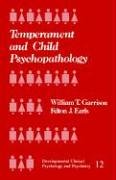Developmental Clinical Psychology and Psychiatry
2 total works
Chronic Illness during Childhood and Adolescence
by William T. Garrison and Susan McQuiston
Published 15 September 1989
This book offers an overview of the critical issues in the assessment and treatment of children with chronic illnesses. Case vignettes, a literature review and the authors′ clinical perspectives combine to inform about both the medical realities of chronic disease and the unique effects on psychological and developmental processes. There are sections on diabetes mellitus, asthma, cystic fibrosis, sickle-cell anemia, childhood cancers and paediatric AIDS. Developmental issues are considered, as are key issues of a case study approach.
Temperament and Child Psychopathology
by William T. Garrison and Felton J. Earls
Published 30 November 1987
The temperament that appears early in life and subsequent psychopathology in childhood and adolescence are thoroughly examined in this insightful study. The authors discuss the multifaceted research on child development and individual differences in relation to child functioning and psychopathology. Alternative views of temperament as well as the role of temperament in child development and child rearing are traced. Important topics are carefully integrated, including developmental continuities in the lifespan, genetic and psychosocial influence on development, and parent-child interaction. In addition, classic longitudinal studies are presented and evaluated and their implications for theory and practice are developed. Unique in its breadth of coverage and remarkable balance in addressing research and practice, Temperament and Child Psychopathology conveys the significance of temperament in the study of child functioning in a highly readable manner. "Excellent book in an excellent series on developmental psychology and psychiatry. . .I can heartily recommend this book to trainees in the field, or to anybody interested in either temperamental development or personality development. The whole series can be recommended to libraries for reference, as the book has an excellent bibliography." --The British Journal of Psychiatry "Useful to readers who wish to obtain a broader based theoretical and empirical overview of the field of temperament, including particular attention to current knowledge about relations between temperament and behavior disorders, and application in clinical practice." --Journal of Clinical Child Psychology "Garrison & Earls provide a useful summary at the end of each chapter within which the major points are discussed. Overall, this is a well-presented, easy to read book with up-to-date research references." --Educational Psychology

